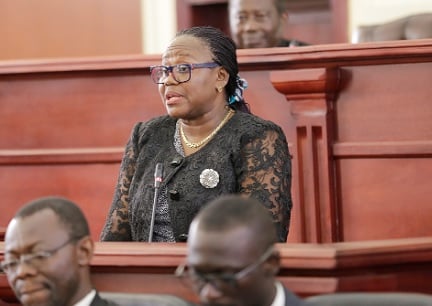The Supreme Court of Ghana has delivered a decisive blow against attempts to halt the impeachment proceedings against Chief Justice Gertrude Sackey Torkornoo. In a 4-1 ruling, the five-member panel, led by Acting Chief Justice Paul Baffoe-Bonnie, dismissed an injunction application filed by the Centre for Citizenship, Constitutional and Electoral Systems (CenCES). This marks the second time the court has rejected efforts to suspend the process, reinforcing the legal foundation upon which the impeachment investigation continues. The court’s decision underscores the seriousness with which it views the preservation of constitutional processes and its reluctance to interfere with proceedings unless clear violations are demonstrably present.
CenCES, a civil society organization, had sought to interrupt the work of the five-member investigative committee tasked with probing the petitions against Justice Torkornoo. Their argument centered on alleged procedural irregularities and violations of the 1992 Constitution, particularly concerning the assertion that President John Mahama hadn’t properly furnished the Chief Justice with the prima facie determination reached in consultation with the Council of State. This omission, according to CenCES, fundamentally undermined the legitimacy of the impeachment process and the subsequent suspension of the Chief Justice. They contended that without this crucial step, the proceedings were tainted and should be halted pending the outcome of their main case challenging the constitutionality of the entire impeachment process.
The Deputy Attorney-General, Dr. Justice Srem-Sai, robustly contested CenCES’s claims, characterizing their application as speculative and an abuse of judicial process. He argued that all constitutional requirements for initiating impeachment proceedings had been meticulously followed, including the proper dissemination of the prima facie findings to all relevant parties, including the Chief Justice. The Supreme Court’s majority decision appears to have aligned with the Deputy Attorney-General’s arguments, effectively dismissing CenCES’s assertions about procedural irregularities and upholding the legality of the ongoing investigation.
The court’s decision not only allows the impeachment proceedings to continue unimpeded but also sends a strong message about the importance of upholding due process while respecting the separation of powers. By rejecting the injunction application, the court affirmed its trust in the established constitutional mechanisms for handling such matters, emphasizing that judicial intervention should be reserved for instances of clear and demonstrable legal breaches. This decision reinforces the integrity of the impeachment process and safeguards against potential interference from external forces.
This second dismissal of an injunction application further solidifies the legal ground on which the impeachment proceedings are advancing. While the Chief Justice faces serious allegations, the court’s decision underscores the importance of adhering to established legal procedures. The investigative committee can now continue its work without the cloud of legal challenges hanging over its operations, allowing it to focus on gathering evidence and determining the veracity of the accusations leveled against Justice Torkornoo. This ensures a fair and transparent process, which is crucial for maintaining public confidence in the judiciary.
The unfolding impeachment proceedings against Chief Justice Torkornoo represent a significant development in Ghana’s legal and political landscape. The outcome will undoubtedly have far-reaching consequences for the judiciary and the country as a whole. The Supreme Court’s decision to allow the process to continue underscores the gravity of the situation and the commitment to ensuring accountability within the highest echelons of power. As the investigative committee proceeds with its work, the nation awaits the findings, which will ultimately determine the fate of the Chief Justice and shape the future direction of the Ghanaian judiciary.


